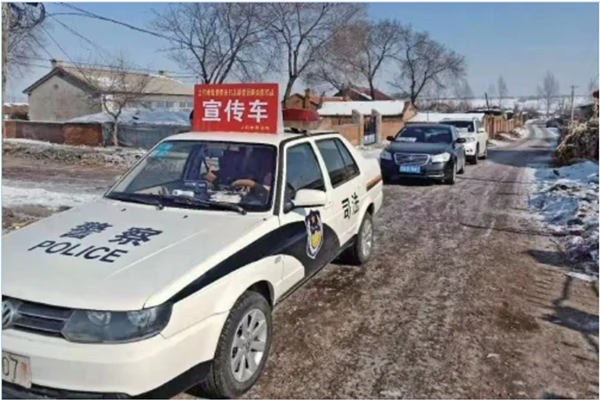Grassroots legal workers work tirelessly in fight against epidemic
Grassroots legal workers across China have been working tirelessly during the battle against the COVID-19 outbreak, making tremendous efforts to protect villages and communities from the virus.
Fight on the front line
Staff at township-level judicial stations across the central province of Hunan promptly called off their vacations and jumped into the battle right after the province launched its first-level public health emergency response.
"Xiong, you've not been back home for more than two weeks. Can you come back today for the Lantern Festival," asked the wife of Xiong Shouyan, head of a judicial station in the city of Changde, over the phone.
"I can't be back since I have to take the temperature of 22 people returning from Hubei and explain the law for them," replied Xiong.
Plagued by cervical cancer and diabetes, his wife has been single-handedly supporting their family since the outbreak. However, after hearing Xiong's reply, she stopped requesting his return and just asked him to take care.
As with Xiong, numerous grassroots legal workers across the country were also making sacrifices in preventing the spread of the virus.
"At this crucial moment, Party cadres must fight at the forefront!" vowed Wu Shenhui, another judicial station chief in a town in Jiangsu province, who were among the first judicial administrative personnel to be deployed to villages for epidemic prevention and control.
Wu's daily schedule was filled with conducting house-by-house screening, overseeing villagers in home quarantine, taking temperatures for people, working at check points and dissuading gatherings, putting him at risk of getting infected.
He soothed his anxious family, saying that "as grassroots legal workers, we are needed by villagers. Don't worry, we will protect ourselves well."
In addition to epidemic prevention, the grassroots legal workers also applied their mediation expertise to settle disputes for people during the outbreak.
Dispute mediation
In the city of Jiangyin in Jiangsu province, a migrant worker surnamed Gao angrily stormed into a hotel and demanded compensation from the hotel for work he had done, which was in arrears.
Commissioned by the local police station, a group of people's mediators stepped in and started to mediate the dispute.
As it turned out, the two sides had agreed that Gao should undertake the wall-painting project for the hotel and would get paid after completing it. However, the hotel refused to pay Gao on various grounds after he finished the work.
The mediators determined that the hotel was to blame and Gao had the right to demand his compensation.
Considering the situation of the epidemic at the time, the mediators suggested that the mediation be conducted through a phone-based remote platform, which both parties agreed to.
Through the effort of the mediators, the hotel finally promised to pay Gao 80,000 yuan ($11,502) first before making the remaining payment. The whole process would be supervised by the mediators.
Law popularization
In a small town of Chengguan in Fujian province, a female law popularization team was playing a vital role in epidemic prevention and control.
With a permanent population of around 12,000, the town was seeing a growing number of gatherings as many migrant workers returned home for Spring Festival, which complicated local epidemic prevention efforts.
Given that circumstance, Fang Qiuxuan, head of the local judicial station, set up a law popularization team made up of female villagers with adequate legal knowledge and village cadres. Together, they carried out law popularization village by village.
After learning that a local pharmacy compelled customers to buy other stuff before selling them masks, the team promptly made an audio recording of relevant legal provisions and broadcast it in the town the next day.
"To avoid the recurrence of such price gauging incidents, we must publicize laws and regulations among local businesses," said Fang.
The team also drafted a range of documents on issues like risk warning, villagers' social responsibility and quarantine and compulsory medical treatment, laying a solid legal basis for the town's epidemic prevention and control effort.
"Although the virus is scary, disobeying or even violating the law is more scarier than the virus as the epidemic prevention and control is at a critical stage," said Fang.

Staff at a judicial station in the northeastern province of Jilin drive cars to disseminate legal information in villages. [File Photo]

Ministry of Justice of the
People's Republic of China
All rights reserved. Presented by China Daily.
京ICP备13016994号-2


